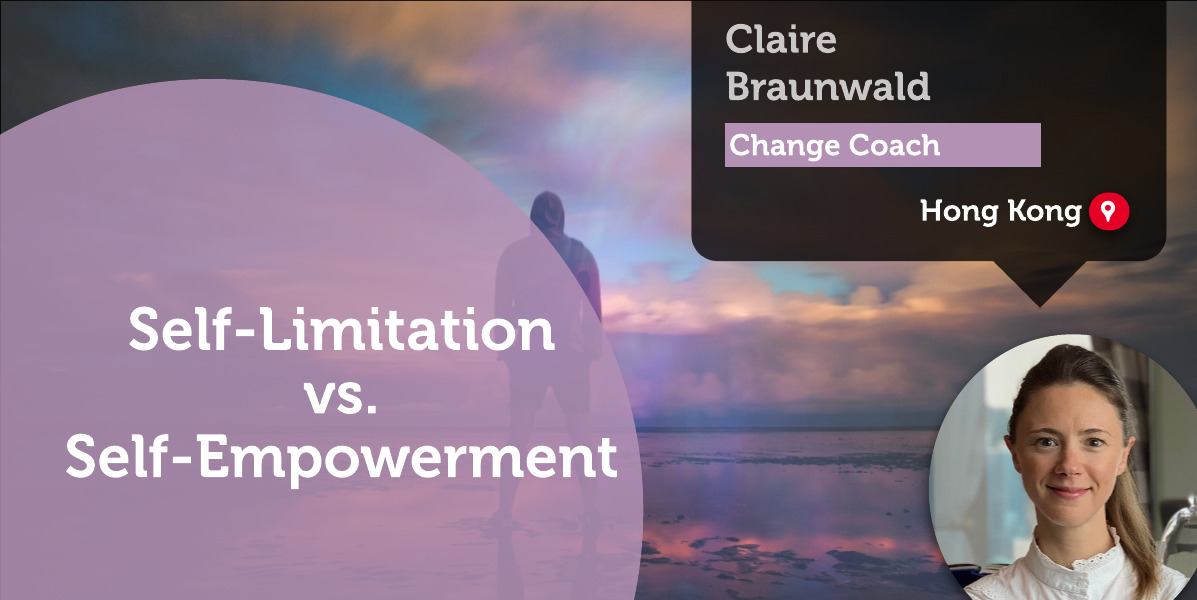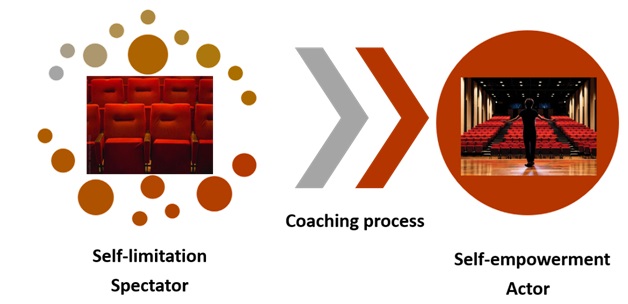A Coaching Power Tool By Claire Braunwald, Change Coach, HONG KONG

Coaching Self-Limitation vs. Self-Empowerment
Coaching is an action-focused, moving forward journey that supports individuals to unleash their full potential and reach their desired destination. The coaching journey starts at point A with the client bringing a topic to a session. With the support of the coach, the client identifies a goal that they wish to get to, point B. During the session, the coach will support the client in creating action for them to move from Point A to B. The common aspect observed with clients at the start of a session is their feeling of being limited or stuck in their progress towards point B. I have observed through this ICA training, the power switch that intervenes in a client’s mindset between the start of the session, and the middle and end of a session. Through the coaching journey, the client gradually gains awareness of the limitations that they set upon themselves and takes the power back on them by identifying a roadmap to overcome them which allows change to happen and a moving forward process to point B. I would like to name this switch of perspective the “self-limitation vs. self-empowerment” power tool that moves the client from a spectator seat to being the actor of the situation.
Self-Limitation vs. Self-Empowerment Illustration

Self-Limitations
If someone has limitations, that person is not as good as they could be. Cambridge dictionary
Believe in your infinite potential. Your only limitations are those you set upon yourself-Roy T. Bennett
“Self-limitations” are self-imposed limitations like self-doubt, a negative outlook on life, or old conditioning; generally created in childhood resulting in feelings and behaviors such as a lack of self-confidence, a lack of language or communication skills, fear or insecurity; making excuses, being too perfectionist or surrounding yourself with the wrong people can also result from self-limitations. Self-limitations can also lead us to a point of wanting to give up or blame others. They can express themselves through an inner voice that says: “I am not good enough”, “I can’t do this”, “I will be judged”, and “This is too difficult”.
Overall, self-limitations are roadblocks that a client creates for themselves and that keep them from seeing the scope of possibilities and being their most authentic and powerful selves.
Self-Empowerment
The process of gaining freedom and power to do what you want or to control what happens to you. Empowerment means people having power and control over their own lives. People get the support they need that is right for them. Cambridge Dictionary
Self-empowerment is the ability to be conscious of our own choices and choose our path to the desired goal. Self-empowerment is key to enacting change in a client and allowing them to achieve their goal. It is a feeling of inner motivation, confidence, and control over our destiny that, supported by the right personal change plan and dedication to putting that plan into practice, will lead to sustainable change in mindset and behavior to reach desired goals.
To illustrate this power tool, I would like to share with you my first experience of switching my perspective from feeling self-limited to being self-empowered, which happened during my first coaching session:
I have completed therapies throughout my life and I consider to have a good level of self-awareness. I brought to my first coaching session a topic about my professional life, which was to implement my passion and training in coaching within my sales career in the luxury hospitality industry; an industry severely affected by the pandemic. I was expressing that I had worked on my plan, being lucid about what could and could not be done. I had a structured plan and timeline however; I was struggling to be focused and committed to it. My goal of the session was therefore to find an action plan to put my action plan in action.
Through the session and the powerful questions that the coach asked me, I realized, for the very first time, that I was an action-focused person. My safe zone, inherited from my childhood was to act promptly on things and situations; I was therefore following my past conditioning, which, in a situation of a long-term project: the restructuring of my professional life and goal, had become a self-limitation as I was rushing too fast into it and expecting too much of myself too soon. This self-limitation had led me to feel frustrated for trying but not being able to commit to my plan, experiencing fear: of being stuck, failing and of external factors that I cannot control. I understood and accepted that, in situations of longer-term career and life planning, being too “action-focused” had become a self-limitation.
Once this self-limitation was addressed and acknowledged with the support of my coach, something clicked as I was starting to see new ideas and next steps to progress; I felt a boost of self-confidence and positivity as if a sun was coming through the clouds that were stuck in my head. I decided to channel my hunger for action by carving time for self-reflection and breaking my plan into achievable and smaller steps leading me to my goal; this was my first and very memorable experience of self-limitation vs self-empowerment in a coaching session.
As a coach, supporting the client to gain awareness of their self-limitations is the first step towards them feeling empowered to do something about it. The coach will support the client through an “onion peeling” process to help them identify the facet(s) of their self-limitation(s) and its consequences in the situation at hand. Once the self-limitations have been uncovered, understood, and owned by the client, the switch to self-empowerment mode can commence. The client, with the support of the coach, can start working on ideas and a plan to achieve their goal. The client no longer feels stuck and sees hope, feels positive about the future and the road to change that is ahead of them; they are self-empowered to act.
Examples of questions that can be asked by the coach to support the client in their self-limitation exploration:
- What is telling you that you need to do this or know why?
- What makes it a challenge for you?
- What is it that you are not getting from…?
- What made you think that?
Examples of questions that support the process of bringing out self-empowerment in the client’s mind:
- What is your gut feeling telling you?
- You seem to be well aware of yourself, what does it tell you?
- How can this realization help you attain your goal of the session?
- What could change if you could do it?
- If this situation was perfectly solved, what would it look like to you?
- What could you do to get there?
“Appreciate inquiry” is a coaching framework that supports “self-empowerment”. Below is an example of an exercise that can be conducted by the coach in a session with the agreement of the client:
- What is the goal or project that you are working towards?
- What makes you excited about it?
- What would you like to gain through this project and at the end of this project?
- What has helped you in the past to accomplish similar goals?
- What steps could you identify to get you there?
References
Change Anything – Kerry Paterson
The “Morning Pages” by Julia Cameron
Daniel Goleman's “Emotional Intelligence”
Brene Brown's “The Power of Vulnerability”
Stephen Covey – “The Covey Model”